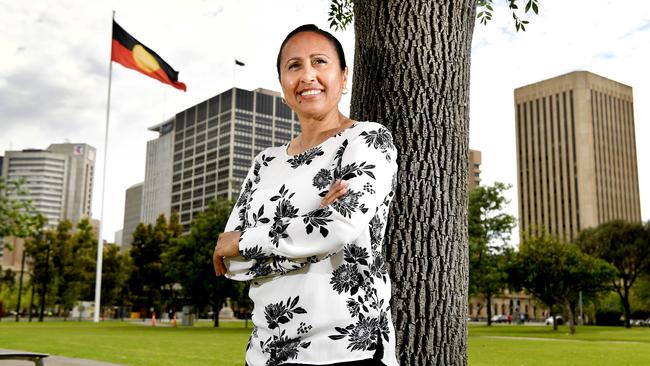Aboriginal Children’s Commissioner April Lawrie ready for ‘challenging conversations’
SUPPORTING families at the first sign they are not coping and opening classrooms to Aboriginal leaders are priorities of the state’s first Aboriginal Children’s Commissioner.
SUPPORTING families at the first sign they are not coping and opening classrooms to Aboriginal leaders are priorities of the state’s first Aboriginal Children’s Commissioner.
April Lawrie will take on the role, recommended by a royal commission, on December 3.
Ms Lawrie, a Mirning woman whose family hails from the far west coast Nullarbor region, said she was ready “to have challenging conversations” in order to not just close the gap between Aboriginal and non-Aboriginal children but prevent it from developing in future generations.
She will be responsible for advocating to improve the health, education, safety and wellbeing of Aboriginal children and young people.
“You can get generational change and you can do it family by family,” she said.
“Any signs of distress, any signs of struggling, not coping, we need our service systems to be working with those families earlier on to keep children safe.

“The services know who those families are, whether it be health, child protection, youth justice. It’s about what we do to engage those families and support them.”
Ms Lawrie, 50, is finalising the Education Department’s new Aboriginal Education Strategy.
She wants to see schools “open their classroom doors to the Aboriginal community”.
“We want our communities to be empowered to be able to develop cultural identity and pride in our kids,” the mother of three boys said.
“Schools can’t do that without the Aboriginal community. So our schools need to open their gates. When (Aboriginal students) see themselves in the curriculum, we know we get better participation and education outcomes.”
As well as partnering with Aboriginal leaders and organisations, the number of Aboriginal public servants must grow to effect change, Ms Lawrie said.
In child protection in particular, the proportion of Aboriginal staff is about 5 per cent of the workforce but Ms Lawrie said that should rise to reflect the fact that Aboriginal children make up about a third of kids in state care.
“We need more Aboriginal people who are trained and qualified to be able to influence change,” she said. “We need to keep our children in the care of their own people.”
Ms Lawrie, who was born in Kimba and went to school in Whyalla, began her career in frontline social work before moving into policy development.
She was attracted to the work after “seeing all these deadly other Aboriginal people in there leading, working for their people, connected to community, making a difference, who are respected by their community for what they do”.
She has since held senior roles in health, education and justice departments.

